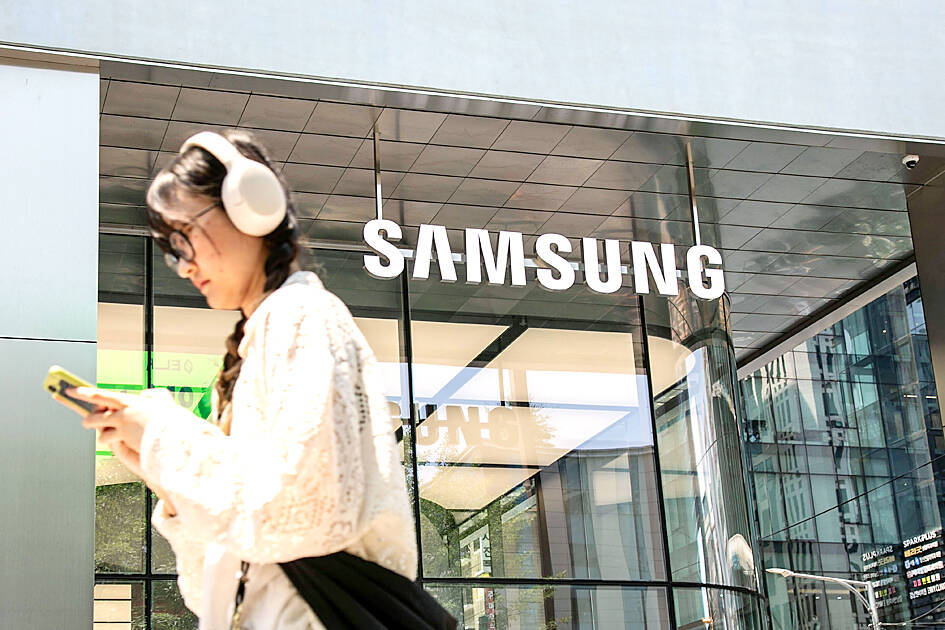Samsung Electronics Co is laying off workers in Southeast Asia, Australia and New Zealand as part of a plan to reduce its global headcount by thousands of jobs, sources familiar with the situation said.
The layoffs could affect about 10 percent of its workforces in those markets, although the numbers for each subsidiary might vary, said one of the sources, who asked not to be named because the matter is private.
Job cuts are planned for other overseas subsidiaries and could reach 10 percent in certain markets, the source said.

Photo: Bloomberg
The South Korean company has about 147,000 in staff overseas, more than half of its total employees of more than 267,800, its latest sustainability report said.
It is not planning layoffs in its home market.
Samsung staff across different teams in Singapore were called into private meetings on Tuesday with human resource managers and their reporting managers, and were informed of the retrenchment and severance package details, another source familiar with the matter said.
“Some overseas subsidiaries are conducting routine workforce adjustments to improve operational efficiency,” a Samsung spokesperson said.
“The company has not set a target number for any particular positions,” the spokesperson added.
Samsung shares have slid more than 20 percent this year as the world’s largest maker of memory chips and smartphones struggles in key markets. It has fallen behind rival SK Hynix Inc in the memory chips used for artificial intelligence (AI), and has made little progress against Taiwan Semiconductor Manufacturing Co (台積電) in the production of custom-made chips for outside customers.
The task of leading Samsung through its latest challenges now falls to executive chairman Jay Y. Lee, grandson of the company’s founder. The 56-year-old was acquitted of stock manipulation charges in February after years of legal troubles.
Samsung is in the unusual position of playing catch-up to SK Hynix, which took the lead in producing the high-bandwidth memory chips that are paired with Nvidia Corp’s AI accelerators to train AI models.
Samsung abruptly replaced the head of its chip business this year and the newly appointed chief, Jun Young-hyun, said the company had to change its workplace culture or get caught in a “vicious cycle.”
The company has reduced the size of its workforce in the past as it has navigated the notoriously cyclical memory-chip market. Samsung recently trimmed about 10 percent of jobs in India and some parts of Latin America, according to one of the sources.
In the latest push, Samsung is likely to cut less than 10 percent of its total overseas staff of 147,000, the source said.
The company aims to preserve manufacturing jobs, while it cuts management and support functions. The figures would be affected by local labor regulations and financial priorities.
Samsung has also been feuding with employees in South Korea. The largest of the tech giant’s several unions called the company’s first strike ever in May.

Intel Corp chief executive officer Lip-Bu Tan (陳立武) is expected to meet with Taiwanese suppliers next month in conjunction with the opening of the Computex Taipei trade show, supply chain sources said on Monday. The visit, the first for Tan to Taiwan since assuming his new post last month, would be aimed at enhancing Intel’s ties with suppliers in Taiwan as he attempts to help turn around the struggling US chipmaker, the sources said. Tan is to hold a banquet to celebrate Intel’s 40-year presence in Taiwan before Computex opens on May 20 and invite dozens of Taiwanese suppliers to exchange views

Application-specific integrated circuit designer Faraday Technology Corp (智原) yesterday said that although revenue this quarter would decline 30 percent from last quarter, it retained its full-year forecast of revenue growth of 100 percent. The company attributed the quarterly drop to a slowdown in customers’ production of chips using Faraday’s advanced packaging technology. The company is still confident about its revenue growth this year, given its strong “design-win” — or the projects it won to help customers design their chips, Faraday president Steve Wang (王國雍) told an online earnings conference. “The design-win this year is better than we expected. We believe we will win

Chizuko Kimura has become the first female sushi chef in the world to win a Michelin star, fulfilling a promise she made to her dying husband to continue his legacy. The 54-year-old Japanese chef regained the Michelin star her late husband, Shunei Kimura, won three years ago for their Sushi Shunei restaurant in Paris. For Shunei Kimura, the star was a dream come true. However, the joy was short-lived. He died from cancer just three months later in June 2022. He was 65. The following year, the restaurant in the heart of Montmartre lost its star rating. Chizuko Kimura insisted that the new star is still down

While China’s leaders use their economic and political might to fight US President Donald Trump’s trade war “to the end,” its army of social media soldiers are embarking on a more humorous campaign online. Trump’s tariff blitz has seen Washington and Beijing impose eye-watering duties on imports from the other, fanning a standoff between the economic superpowers that has sparked global recession fears and sent markets into a tailspin. Trump says his policy is a response to years of being “ripped off” by other countries and aims to bring manufacturing to the US, forcing companies to employ US workers. However, China’s online warriors